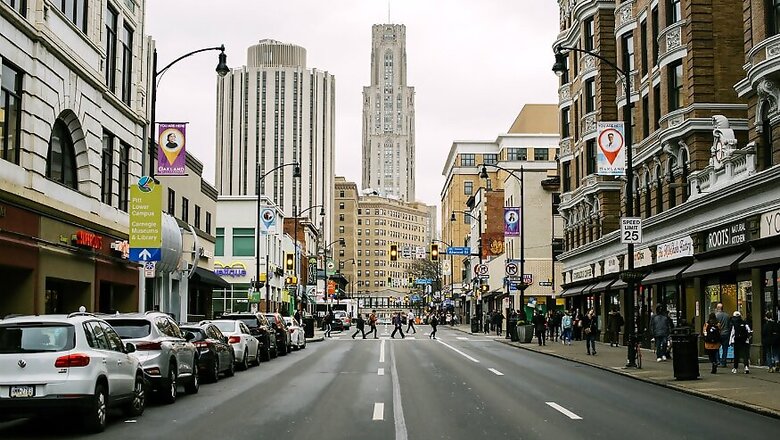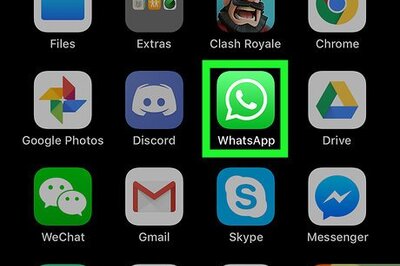
views
Pittsburgh: In 2003, when SARS was spreading, Edward Zhang was not yet a teenager and living with his parents in Wuhan, China, largely dependent on the morning paper and the nightly news to know what was happening in the next city over.
The world has changed a lot since then. Now, as the coronavirus renders his home city a ghost town, overwhelming hospitals and forcing his friends and family to don masks in their own homes, Zhang is updated constantly despite living over 7,000 miles away, in Pittsburgh.
“I might be finding things out faster than my parents,” he said, describing a steady stream of videos, photographs and reports from his friends in Wuhan, even information about specific apartments in specific buildings where the coronavirus has apparently struck.
It’s a small world after all, a frightening thought if the virus becomes a global pandemic, but a mixed blessing for the scores of Wuhan natives living in Pittsburgh, which has been a “sister city” of Wuhan for nearly 40 years.
The designation does not mean much officially, beyond the creation of some local partnerships and occasional delegation visits, where ideas about economics and bike-share plans are exchanged. But it does provoke some extra urgency to help out on the part of city leaders in Pittsburgh, who have offered assistance, and certainly on the part of people from Wuhan like Zhang, 28, who works for an online retailer of prescription eyeglasses. Along with several groups in the city, he helped set up an online fundraiser for critical medical supplies that has raised nearly $50,000.
Wuhan is a much bigger city than Pittsburgh, but the two bear a certain resemblance; in an interview, Mayor Bill Peduto of Pittsburgh called Wuhan a “postindustrial city that has created a new economy based upon technology and medicine.” Both are former steel cities at the confluence of major rivers, and as Pittsburgh had decades ago, Wuhan has recently taken on the heavy task of cleaning up and reinventing itself.
People from Wuhan began settling in Pittsburgh, a city of about 300,000, in the late 1980s. They stay in touch with one another in a WeChat group and formally get together twice a year to talk and eat — particularly the hometown favorite, hot dry noodles. The number of Pittsburghers who hail from Hubei province, of which Wuhan is the capital, is said by some to be around two or three hundred.
“I was surprised how big a group there was from Hubei province,” said Dr. Jing He, a neuroscience researcher who grew up near Wuhan and arrived in Pittsburgh two and a half years ago.
Like Wuhan, Pittsburgh is a big college and university city. There are nearly 3,000 Chinese students at Carnegie Mellon University, an engineering powerhouse, and nearly 1,900 Chinese students at the University of Pittsburgh, 53 of them from Hubei province. For years, graduate students from Wuhan University taught Chinese at an institute on Pitt’s campus, although that program was suspended last summer because of visa issues with the State Department.
Many students from Wuhan are in the medical field, often ending up at the University of Pittsburgh Medical Center, a regional health care giant. They were particularly well-prepared to act after hearing the news from home in January.
“We told friends and classmates, ‘Hey, we heard there’s a problem there,’ but they said, ‘Everything is normal,’” said Xiaoming Li, an engineer who grew up in Wuhan but has lived in Pittsburgh for 26 years. That was early on, when people thought the sickness was confined to customers and vendors at a local meat market.
But suddenly the government declared that the virus could be spread by human-to-human contact and sealed off Wuhan, a city of 11 million. What became a matter of concern immediately became a mass emergency. Natives of Wuhan in Pittsburgh, many of whom are friends with the doctors now in Wuhan hospitals, heard dire reports.
“They are short of medical supplies, short of doctors, nurses, short of everything,” Li said.
Jing He heard the same things — when he heard from people at all. “It’s very, very scary,” he said. “My classmate works at a hospital in Wuhan. I try and try to reach my friend but she doesn’t reply. I assume she is overwhelmed with all the patients.”
Still, this was the advantage of many of those from Wuhan now in Pittsburgh: They personally know the medical professionals who need the masks, gloves and other supplies, so they can send them directly rather than relying on third parties like the Red Cross. A first shipment has already gone out.
Fundraising continues — the owners of the city’s Chinese restaurants raised a few thousand dollars at their annual Lunar New Year party — but the challenge is finding enough supplies to buy. Organizers of the fundraiser said American suppliers were reluctant to sell large amounts in case of an outbreak in the United States, where 12 cases of coronavirus had been confirmed as of Thursday evening.
They understand this reluctance: Their other priority is, obviously, to keep the disease from gaining any foothold here. Volunteers within the Chinese community are bringing groceries to people who have returned from China recently and are secluding themselves in voluntary self-quarantine, as institutions around the city are urging.
So far, there are no confirmed cases in Pittsburgh. Zhang has his hands full as it is. “There’s already an outbreak in my hometown,” he said. “I don’t want another.”
Campbell [email protected] The New York Times Company


















Comments
0 comment